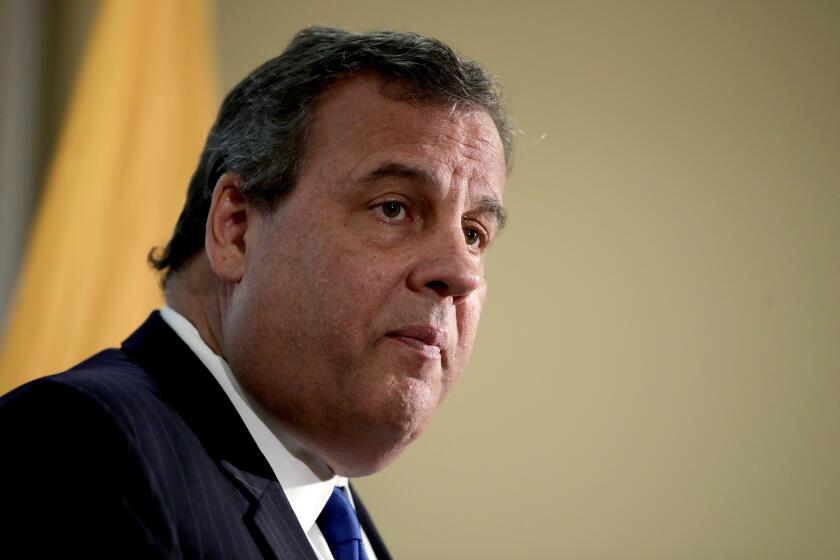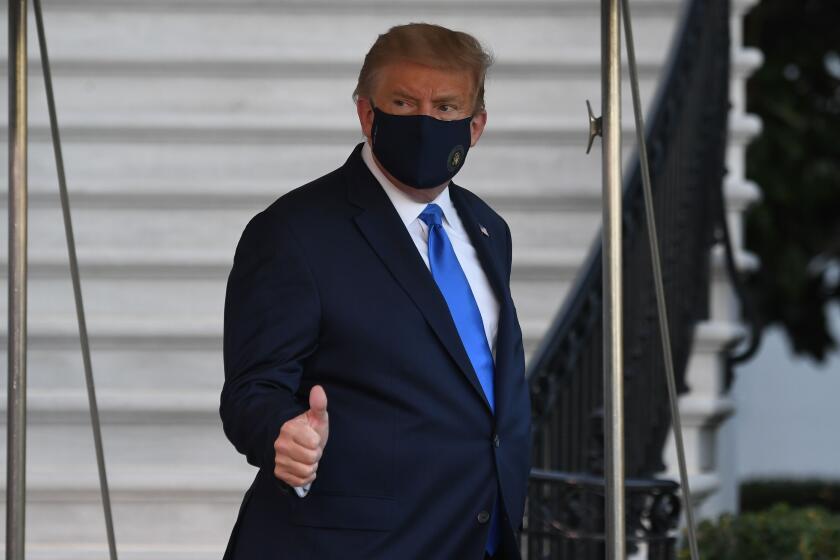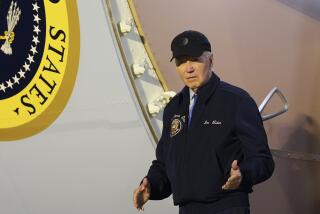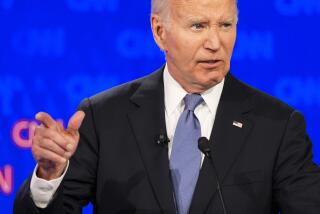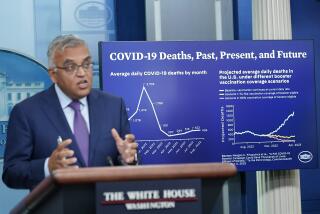Trump’s COVID-19 raises the question: How will the presidential campaign go on?

For months, the presidential race has been stubbornly static, but on Friday a huge question emerged: Where does it go from here?
With President Trump hospitalized with COVID-19 for at least the next few days, it is unclear when or if he will get back to campaigning; how voters — largely impervious to any number of startling events — will react to his sudden illness; and what Democrat Joe Biden does in the meantime.
Not least, it is uncertain whether two more presidential debates will come off as planned, allowing Trump a badly needed do-over after his caustic performance on Tuesday drew widespread rebuke.
“We haven’t gotten that far yet,” White House Press Secretary Kayleigh McEnany said on Fox News.
Follow along here for the latest about Trump’s positive coronavirus test and what the news means for the presidential campaign.
A debate between Vice President Mike Pence and Biden’s running mate, California Sen. Kamala Harris, is expected to go on as scheduled Wednesday after both tested negative for the coronavirus.
But as the 74-year-old Trump was helicoptered to Walter Reed National Military Medical Center just outside Washington, his campaign said “all previously announced campaign events involving” the president and his family “are in the process of being moved to virtual events or are being temporarily postponed.”
Among the cancellations were fundraisers scheduled next week in Orange County and Beverly Hills.
Biden, 77, who announced two negative tests for the disease, visited Michigan on Friday while Harris stumped in Nevada.
Appearing masked before a socially distanced audience of about 50 people at a union hall in Grand Rapids, Biden said he and his wife, Jill, were praying for the president and for First Lady Melania Trump, who was also diagnosed with COVID-19. Their sickness, Biden said, is above politics.
But, he went on, their infection was “a bracing reminder to all of us that we have to take this virus seriously.”
Urging everyone to wear a mask — something Trump conspicuously shunned — Biden said it was the patriotic thing to do. “It’s not about being a tough guy,” Biden said. “It’s about doing your part.”
The Democrat appeared despite warnings from medical experts that his tests do not ensure he is free of the disease, which can take up to two weeks to incubate. At the urging of doctors, Biden cancelled a second event scheduled for Friday night at his Delaware headquarters.
His campaign also pulled down all of its negative advertising, leaving just positive TV spots to make the case for Biden’s election.
In other ways, though, the campaign went on as before.
After the former vice president put out a call on Twitter for national unity — “we have to come together as a nation” — Trump’s campaign sent out a fundraising email excoriating “Phony Kamala” and “Sleepy Joe... who is probably already asleep in his basement.” The latter referred to the months Biden spent avoiding possible infection by limiting his travels.
Some Biden allies and Trump foes said they had no intention of modulating their attacks on the president, despite his condition.
“The reasons for why he should not be reelected have not changed, other than the fact that he clearly didn’t take this seriously enough personally,” said Reed Galen, a co-founder of the Lincoln Project, a group of renegade Republicans who have broadcast some of the harshest anti-Trump advertising of the campaign.
“We obviously wish him and the first lady well,” said Galen, who served in the George W. Bush administration. “But we have a mission and that is to defeat him in November, and we’ll do everything we can do to make that happen.”
The fundamentals of the presidential race remain the same. Biden continues to hold a steady lead in national polls as well as in the battleground states needed to win the White House.
But the turnabout on Friday was striking. Biden, who was mocked for sheltering at home against the deadly virus, was traveling the country. The president who scoffed at his prudence and minimized the risk of the pandemic — encouraging others to do the same — was laid low.
The absence of live campaign events for the foreseeable future is a particular blow to Trump, who not only gets emotional sustenance from his rowdy appearances but also uses them as an organizing, money-raising and mobilization tool for his campaign.
Privately, while praising Biden for his caution and mindfulness in avoiding large rallies, some Democrats worried that Trump was benefiting from the dynamism of his events and the image of forging ahead despite the danger.
The president’s diagnosis instantly changed that, highlighting with neon-bright emphasis what has consistently been one of the greatest impediments to his reelection: a broadly criticized response to the pandemic that has killed more than 208,000 people in the U.S. and well over 1 million worldwide.
Trump has repeatedly tried to shift attention away from the virus: to “law and order,” as he defined a crackdown on largely peaceful protests against racism; to the economy that perked along before COVID-19 swept the country; to his nomination of federal judge Amy Coney Barrett to the Supreme Court, cementing its conservative tilt for perhaps a generation.
His own diagnosis after months of downplaying the pandemic and flouting the advice of medical experts makes that change in focus exceedingly difficult, if not impossible, to pull off.
“This validates what Joe Biden and the Democrats have been saying all along: the president hasn’t been taking the COVID-19 virus seriously,” said Thomas Whalen, a presidential historian at Boston University.
Indeed, in a pre-recorded speech for the annual Al Smith Dinner on Thursday night, held just hours before the announcement of his diagnosis, Trump said: “I just want to say that the end of the pandemic is in sight.”
President Trump was hospitalized at Water Reed on Friday evening after suffering symptoms of COVID-19. Vice President Mike Pence tested negative.
No candidate in the last half-century has faced a potentially life-threatening illness so close to election day. Hillary Clinton fell ill with pneumonia in September 2016 but was able to continue her campaign.
Trump sought to capitalize on the episode by belittling his rival and questioning her capacity to serve as president. At one rally he swayed and stumbled onstage as he imitated Clinton’s woozy departure from a Sept. 11 commemoration.
If the moment lacked empathy, it also signaled the mode of all-out political warfare that has come to define the Trump era. His critics showed no hesitation Friday pressing their attack.
After extending good wishes to Trump and the first lady, the Coronavirus War Room — a liberal advocacy group focused on healthcare — “expressed concern for all those who have been potentially exposed to this virus against their wills because of President Trump’s refusal to take basic precautions like wearing a mask and engaging in social distancing.”
The statement enumerated, among others, Secret Service agents, White House staff, members of Congress, Air Force personnel, those who attended the debate and supporters who have showed up at Trump fundraisers and rallies.
A spokesman for Priorities USA, a pro-Biden political action committee, said there were “no plans to pull back on our ongoing efforts to hold the president accountable for his failures on the pandemic.
The Biden campaign opted not to pile on.
In a memo, campaign manager Jen O’Malley Dillon urged staffers to refrain from posting “about the situation on social media.” She also said the campaign, in consultation with health experts, “continued to take every precaution to protect” Biden, Harris, their spouses and the campaign’s staff.
The campaign then announced a series of upcoming events.
Times staff writers Jenny Jarvie, Melanie Mason, Seema Mehta and James Rainey contributed to this report.
More to Read
Get the L.A. Times Politics newsletter
Deeply reported insights into legislation, politics and policy from Sacramento, Washington and beyond. In your inbox three times per week.
You may occasionally receive promotional content from the Los Angeles Times.

